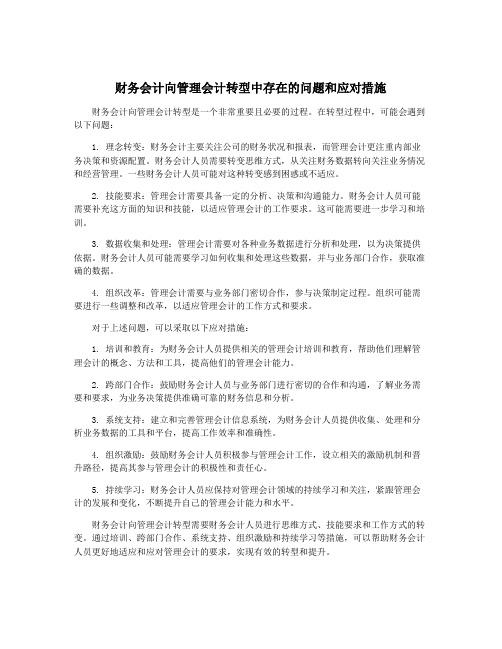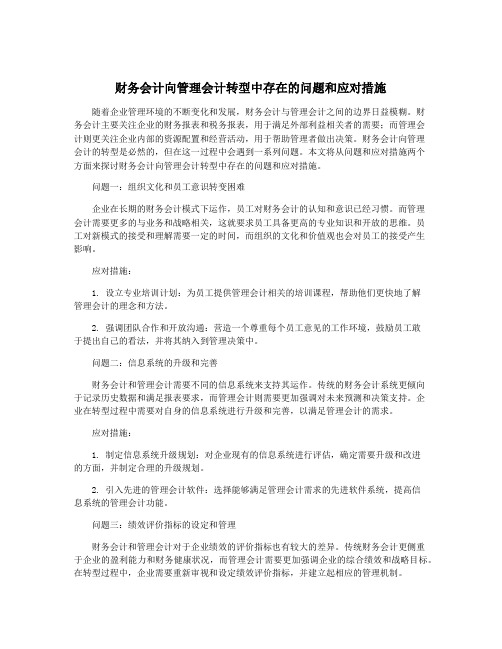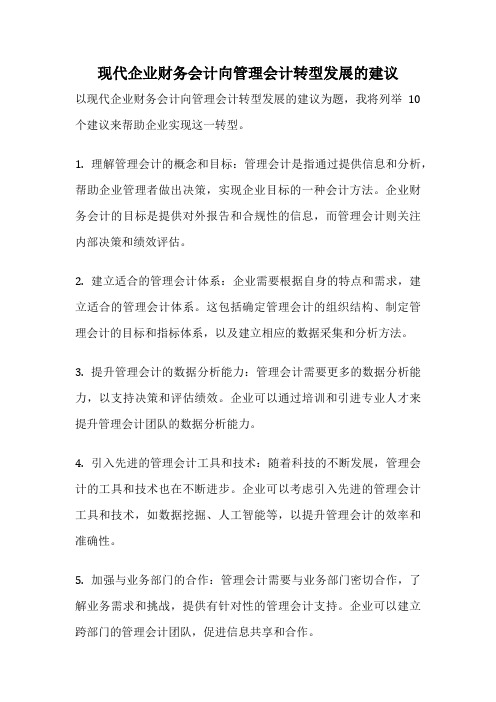财务人员如何顺应财务会计向管理会计的转型—3000英文翻译
财务会计向管理会计转型中存在的问题和应对措施

财务会计向管理会计转型中存在的问题和应对措施财务会计向管理会计转型是一个非常重要且必要的过程。
在转型过程中,可能会遇到以下问题:1. 理念转变:财务会计主要关注公司的财务状况和报表,而管理会计更注重内部业务决策和资源配置。
财务会计人员需要转变思维方式,从关注财务数据转向关注业务情况和经营管理。
一些财务会计人员可能对这种转变感到困惑或不适应。
2. 技能要求:管理会计需要具备一定的分析、决策和沟通能力。
财务会计人员可能需要补充这方面的知识和技能,以适应管理会计的工作要求。
这可能需要进一步学习和培训。
3. 数据收集和处理:管理会计需要对各种业务数据进行分析和处理,以为决策提供依据。
财务会计人员可能需要学习如何收集和处理这些数据,并与业务部门合作,获取准确的数据。
4. 组织改革:管理会计需要与业务部门密切合作,参与决策制定过程。
组织可能需要进行一些调整和改革,以适应管理会计的工作方式和要求。
对于上述问题,可以采取以下应对措施:1. 培训和教育:为财务会计人员提供相关的管理会计培训和教育,帮助他们理解管理会计的概念、方法和工具,提高他们的管理会计能力。
2. 跨部门合作:鼓励财务会计人员与业务部门进行密切的合作和沟通,了解业务需要和要求,为业务决策提供准确可靠的财务信息和分析。
3. 系统支持:建立和完善管理会计信息系统,为财务会计人员提供收集、处理和分析业务数据的工具和平台,提高工作效率和准确性。
4. 组织激励:鼓励财务会计人员积极参与管理会计工作,设立相关的激励机制和晋升路径,提高其参与管理会计的积极性和责任心。
5. 持续学习:财务会计人员应保持对管理会计领域的持续学习和关注,紧跟管理会计的发展和变化,不断提升自己的管理会计能力和水平。
财务会计向管理会计转型需要财务会计人员进行思维方式、技能要求和工作方式的转变。
通过培训、跨部门合作、系统支持、组织激励和持续学习等措施,可以帮助财务会计人员更好地适应和应对管理会计的要求,实现有效的转型和提升。
财务会计如何向管理会计转型

财务会计如何向管理会计转型【摘要】财务会计和管理会计在企业管理中具有不同的角色和功能。
财务会计主要关注公司的财务信息记录和报告,而管理会计则更注重为管理层提供决策支持和管理信息。
本文介绍了财务会计向管理会计转型的过程,包括了解管理会计的概念和目的、学习管理会计的方法和工具、培养管理会计的思维模式、加强与管理层的沟通和合作,以及实践管理会计的技能和应用。
通过财务会计向管理会计转型,可以为企业提供更全面和准确的管理信息,帮助管理层做出更好的决策。
未来,财务会计在管理会计领域的发展还有很大的空间,强调了继续学习和提升自身能力的重要性。
通过不断学习和实践,财务会计可以更好地服务于企业管理,推动企业的可持续发展。
【关键词】财务会计、管理会计、转型、概念、方法、工具、思维模式、沟通、合作、技能、应用、好处、发展、学习、能力。
1. 引言1.1 介绍财务会计和管理会计的区别财务会计和管理会计是两个不同的概念,在企业管理中扮演着不同的角色。
财务会计主要是针对外部利益相关者,如投资者、债权人、政府监管部门等。
它主要关注企业的财务状况和运营结果,以提供给外部利益相关者决策参考。
财务会计侧重于编制财务报表,披露企业账务情况,侧重于过去的数据和绩效。
而管理会计则主要是针对内部管理人员,如经理和决策者。
它的目的是为了帮助管理层做出决策,提升企业的绩效和效益。
管理会计更注重企业内部运营和管理,专注于未来的规划和决策支持。
财务会计和管理会计的区别主要在于其对象、目的和内容。
财务会计是为了满足外部利益相关者的信息需求,主要侧重于企业财务的记录和报告;而管理会计则是为了内部管理人员做出决策和规划,帮助企业提升效益和竞争力。
财务会计更倾向于过去的数据和报告,而管理会计更注重未来的规划和决策支持。
通过理解这两者之间的区别,可以更好地实现财务会计向管理会计的转型,提升企业管理水平和绩效。
1.2 定义财务会计如何向管理会计转型财务会计向管理会计转型是当前企业财务管理领域的一个重要趋势。
财务会计向管理会计的转型发展路径

财务会计向管理会计的转型发展路径财务会计是企业中负责会计核算的岗位,主要负责编制会计账簿,处理会计凭证,计算税费等核算工作。
而管理会计则是企业中负责管理决策的岗位,主要负责预算编制,成本控制,业务分析等管理决策支持工作。
近年来,随着企业竞争的加剧,财务会计已不能满足企业管理的要求,因此企业需要将财务会计向管理会计的转型发展。
第一步:转变观念,明确目标企业在转型发展之前,首先需要改变财务部门以往的传统观念,引导财务人员转变角色,从“被动配合”到“主动参与”。
企业需要建立以成本控制、利润增长和现金流为导向的财务管理体系,做到“财务部门是企业管理的重要参与者”,即通过财务部门对会计信息的掌控,为企业的决策提供专业的分析和建议。
第二步:建立绩效考核机制为了推动财务人员积极参与管理决策,企业需要建立科学的绩效考核机制。
该机制要求财务人员不仅能熟练掌握会计核算,还需要具备主动参与企业管理决策和提供专业建议的能力,而这需要财务人员不断扩展知识面、增强综合素质,提升专业技能水平。
第三步:搭建数据平台企业需要建立可靠、高效的数据平台,汇集各类数据资源,整理归类,为管理层提供智能化、高效的决策支持服务。
这就需要用先进的信息技术手段,加强数据分析和挖掘能力,为管理层提供重要的决策参考。
第四步:加强沟通合作企业内部要加强沟通合作,促进各部门之间的协同作战。
例如,公司内部若有超过预期的支出,财务人员需及时通知相关部门调整预算,避免后期损失。
同时,整合资源和协同工作将会加强企业内部的效率和质量,充分发挥各部门的协调作用,带来更多的经济效益。
第五步:提升专业素养财务人员需要不断提升专业素养,学习管理会计知识和技能。
企业应该为财务人员提供培训机会,提供优良的学习环境,让他们在不断充实自己的同时,更好的为企业做出贡献。
总之,财务会计向管理会计的转型发展是一个不断推进的过程。
需要企业在推动转型过程中更加注重管理学和财务学相结合,运用多种手段、不断改进和完善财务管理体系,为企业的稳健发展创造更有利的条件。
【财务会计】财务会计向管理会计转型思路

【财务会计】财务会计向管理会计转型思路在当今的商业环境中,企业面临着日益复杂的竞争和不断变化的市场需求。
财务部门作为企业的核心职能之一,也需要不断适应和变革。
财务会计向管理会计的转型已成为一种趋势,这不仅能够提升财务部门对企业决策的支持能力,还能为企业创造更大的价值。
一、财务会计与管理会计的区别财务会计主要侧重于对企业过去经济活动的记录和报告,遵循会计准则和法规,以提供准确、客观的财务报表为主要目标。
其工作重点在于核算和监督,如记录账目、编制报表、进行审计等。
而管理会计则着眼于未来,运用各种分析方法和工具,为企业内部的管理决策提供支持。
它关注的是如何通过财务数据和非财务数据的整合分析,为企业制定战略、规划预算、控制成本、评估绩效等提供有价值的信息。
二、财务会计向管理会计转型的必要性1、适应企业发展需求随着企业规模的扩大和市场竞争的加剧,单纯的财务核算已无法满足企业管理的需要。
管理会计能够从战略高度为企业提供决策支持,帮助企业更好地规划资源、优化业务流程、提升竞争力。
2、提升财务管理价值财务会计往往局限于数据的记录和报告,而管理会计能够深入挖掘数据背后的信息,为企业创造更多的价值。
例如,通过成本分析和控制,降低企业运营成本;通过投资决策分析,提高资金使用效率。
3、应对信息技术发展信息技术的快速发展使得财务数据的处理和分析更加便捷高效。
财务会计的一些基础性工作逐渐被自动化软件所替代,财务人员需要向更具价值创造的管理会计领域转型。
三、财务会计向管理会计转型的难点1、思维方式的转变财务会计人员习惯于遵循既定的规则和流程,注重数据的准确性和合规性。
而管理会计需要具备创新思维、战略思维和全局思维,能够从宏观角度分析问题,提出解决方案。
2、知识技能的不足管理会计需要掌握更多的分析方法和工具,如成本管理、预算编制、绩效评估、风险管理等,同时还需要了解业务流程和市场动态。
财务会计人员在这些方面可能存在知识和技能的欠缺。
财务会计向管理会计转型——以“人工智能+”背景为例

1引言人工智能与财务管理工作的深度结合,促使企业财务管理工作逐渐朝向自动化与智能化方向发展。
在这种发展态势下,传统财务处理方式已经难以适用于现代化企业财务管理工作当中,财务管理工作必须发生颠覆性变化才能彻底适应人工智能发展背景。
在人工智能背景下,企业财务管理工作需要主动利用信息化手段,整合财务数据以及相关资源,为企业各项经营管理决策提供良好的数据保障,规避传统财务管理方式存在的滞后性问题。
结合当前发展情况来看,在新一代科技革命与产业变革的助推作用下,人工智能在多个专业领域中取得了良好的应用成果。
结合相关数据调查显示,在未来的10年内会计行业将可能是受到人工智能应用影响最大的专业领域。
从企业会计管理角度来看,目前传统财务会计管理理念已经被管理会计理念所弱化,并且通过结合人工智能等技术内容,减少财务工作重复性劳动问题,保障企业财务工作质量得以提高。
不难看出,在人工智能技术的支持下,财务会计向管理会计的转型发展进程将会得到进一步推进。
2“人工智能+”背景下财务会计与管理会计的相关分析2.1财务会计与管理会计的内涵特点财务会计始终坚持以会计基本财务制度为标准,通过借助专业记载方式完成对企业财务信息的有效记录以及统计分析过程。
管理人员可根据财务信息反馈情况,对当前企业某一阶段的经营管理情况以及财务交易活动情况进行准确把握。
管理会计属于在财务会计的基础上延伸而来的一种更适合现代企业管理的财务方法。
通过利用系统化方式实现对企业运营管理信息以及财务经济数据的整合分析,并根据分析反馈结果,制定企业管理运营决策[1]。
2.2“人工智能+”背景下财务会计与管理会计的差异近年来,随着人工智能技术的飞跃式发展,该项技术已经成功融入各专业领域当中进行实践应用,所取得的效果十分显著。
对于企业财务管理工作而言,在人工智能技术的决策支持下,企业财务会计与管理会计之间所呈现出的差异性特点越来越明显。
一方面,“人工智能+”背景下,企业财务核算工作更加侧重于服务于企业管理层。
论大数据背景下财务会计向管理会计转型的策略

【作者简介】段朝坤(1981-),男,湖南新化人,会计师,从事财务管理研究。
论大数据背景下财务会计向管理会计转型的策略Discussion on the Strategy of the Transition from Financial Accounting toManagement Accounting Under the Background of Big Data段朝坤(华能国际电力股份有限公司上安电厂,石家庄050310)DUAN Chao-kun(Shang'an PowerPlant ofHuanengPowerInternational,Inc,Shijiazhuang050310,China)【摘要】高速发展的计算机技术与互联网技术为大数据时代的到来提供了契机,而大数据时代不仅带来了各行各业信息收集方式的转变,同时也改变了人们的思维模式。
在此背景下,传统的企业财务会计已无法满足时代发展需求,为适应企业发展,应加快实现由财务会计向管理会计的转型。
【Abstract】The rapid development of computer technology and internet technology provides an opportunity for the arrival of big data era.Andthe era of big data has not only brought about changes in the ways of information collection in all walks of life,but also changed people's thinking mode.Inthiscontext,the traditional financial accounting ofenterprises has been unable to meet the needs ofthe development ofthe times.In order toadapt tothedevelopment ofenterprises,weshouldacceleratethetransformation fromfinancial accountingtomanagement accounting.【关键词】大数据;财务会计;管理会计;转型【Keywords】bigdata;financial accounting;management accounting;transformation 【中图分类号】F275【文献标志码】A【文章编号】1673-1069(2018)08-0052-021相关概念分析所谓大数据,通俗理解也就是海量数据,具体是指现代企业在日常生产与运营中所涉及的无法通过人工进行处理的数据信息量。
财务会计向管理会计转型中存在的问题和应对措施

财务会计向管理会计转型中存在的问题和应对措施随着企业管理环境的不断变化和发展,财务会计与管理会计之间的边界日益模糊。
财务会计主要关注企业的财务报表和税务报表,用于满足外部利益相关者的需要;而管理会计则更关注企业内部的资源配置和经营活动,用于帮助管理者做出决策。
财务会计向管理会计的转型是必然的,但在这一过程中会遇到一系列问题。
本文将从问题和应对措施两个方面来探讨财务会计向管理会计转型中存在的问题和应对措施。
问题一:组织文化和员工意识转变困难企业在长期的财务会计模式下运作,员工对财务会计的认知和意识已经习惯。
而管理会计需要更多的与业务和战略相关,这就要求员工具备更高的专业知识和开放的思维。
员工对新模式的接受和理解需要一定的时间,而组织的文化和价值观也会对员工的接受产生影响。
应对措施:1. 设立专业培训计划:为员工提供管理会计相关的培训课程,帮助他们更快地了解管理会计的理念和方法。
2. 强调团队合作和开放沟通:营造一个尊重每个员工意见的工作环境,鼓励员工敢于提出自己的看法,并将其纳入到管理决策中。
问题二:信息系统的升级和完善财务会计和管理会计需要不同的信息系统来支持其运作。
传统的财务会计系统更倾向于记录历史数据和满足报表要求,而管理会计则需要更加强调对未来预测和决策支持。
企业在转型过程中需要对自身的信息系统进行升级和完善,以满足管理会计的需求。
应对措施:1. 制定信息系统升级规划:对企业现有的信息系统进行评估,确定需要升级和改进的方面,并制定合理的升级规划。
2. 引入先进的管理会计软件:选择能够满足管理会计需求的先进软件系统,提高信息系统的管理会计功能。
问题三:绩效评价指标的设定和管理财务会计和管理会计对于企业绩效的评价指标也有较大的差异。
传统财务会计更侧重于企业的盈利能力和财务健康状况,而管理会计需要更加强调企业的综合绩效和战略目标。
在转型过程中,企业需要重新审视和设定绩效评价指标,并建立起相应的管理机制。
财务会计向管理会计的转型发展路径

财务会计向管理会计的转型发展路径1. 从财务报表分析到内部管理报告:财务会计主要关注企业的财务状况和经营业绩,通过编制财务报表来向外部股东、投资者和监管机构公开披露。
在向管理会计转型的过程中,需要进一步了解企业的内部运营情况,培养财务人员分析企业内部数据的能力,编制内部管理报告,为企业管理层提供更详细的经营决策依据。
2. 从成本计算到成本控制:财务会计主要关注企业的成本核算,通过计算各项成本将其分配到产品或服务中,在财务报表中反映出来。
在向管理会计转型的过程中,需要加强对成本的分析和控制,通过建立成本控制系统,实时监控和管理各项成本,为企业降低成本、提高效益提供支持。
3. 从预算编制到绩效管理:财务会计主要通过编制预算来规划企业的收入和支出,在财务报表中反映预算执行情况。
在向管理会计转型的过程中,需要更加注重绩效管理,从单纯的预算编制过渡到对预算执行进行监控和评估,建立绩效管理体系,通过制定有效的绩效指标,对企业的经营绩效进行评估和激励。
4. 从历史数据分析到未来规划:财务会计主要通过分析历史数据来评估企业的财务状况和经营业绩。
在向管理会计转型的过程中,需要更加注重未来规划,通过利用各种管理会计工具和方法,对未来的经营环境和竞争趋势进行预测和规划,帮助企业制定战略方向和商业决策。
5. 从单一角色到综合管理者:财务会计主要负责财务核算和报告工作,向上级报告财务情况。
在向管理会计转型的过程中,需要转变角色,成为综合管理者,参与和协助企业的战略规划和决策,与其他部门进行沟通和协调,为企业整体运营提供支持。
财务会计向管理会计的转型发展路径是一个逐步深化和扩展的过程,需要财务人员不断学习和提升自身的能力,积极适应企业管理需求的变化,以促进企业的可持续发展。
财务会计向管理会计的转型发展路径

财务会计向管理会计的转型发展路径1. 从数据记录到数据分析:传统的财务会计主要关注企业的交易数据记录和报表编制,而管理会计强调对这些数据进行深入的分析和解读,以为企业经营决策提供有价值的信息。
财务会计人员需要通过提升数据分析能力,将数据转化为对企业运营和管理有意义的信息。
2. 从历史性报告到实时性决策支持:财务会计的报告往往是基于历史数据编制的,反映了过去一段时间内的财务状况和业绩,而管理会计则更加关注对当前的和未来的决策提供支持。
财务会计人员需要学习并应用现代管理会计工具和方法,能够为企业提供更及时准确的项目分析、成本控制和预测预测。
3. 从财务指标到绩效指标:财务会计主要关注企业的财务状况和业绩,例如利润、资产和负债等指标。
而管理会计强调对企业绩效的多维度评估,包括财务绩效、客户满意度、内部流程效率和学习与成长等指标。
财务会计人员需要学习并应用绩效管理的理论和方法,能够为企业提供全面的绩效评估和管理建议。
4. 从成本核算到价值链管理:传统的财务会计主要关注成本核算,包括直接成本和间接成本的分配。
管理会计则强调在全价值链范围内进行成本管理,从供应商、生产、销售到客户等各个环节进行成本分析和优化。
财务会计人员需要学习并应用成本管理的方法和工具,能够为企业提供全面的成本优化策略和控制方案。
5. 从财务报告到管理报告:财务会计主要通过编制财务报告来反映企业的财务状况和业绩,而管理会计强调通过编制管理报告来反映企业各个方面的绩效和问题。
财务会计人员需要学习并应用管理报告的编制方法和技巧,能够为企业提供全面准确的管理信息和建议。
财务会计向管理会计的转型发展路径需要财务会计人员具备更加全面的技术和能力,了解企业的运营和管理需求,掌握现代管理会计工具和理论,能够为企业提供更加有价值的信息和决策支持。
财务会计向管理会计的转型发展路径

财务会计向管理会计的转型发展路径随着市场经济的发展和企业管理的日益复杂,财务会计作为企业管理的重要组成部分,正逐渐向管理会计转型。
财务会计和管理会计虽然都是会计领域的重要分支,但二者在目标、内容和方法上存在很大差异。
财务会计主要关注企业的财务报表,以满足外部财务报告的要求;而管理会计则更注重企业的内部管理,以支持企业的决策制定和执行。
本文将探讨财务会计向管理会计的转型发展路径,并分析影响转型的因素及发展趋势。
一、财务会计和管理会计的差异财务会计是以编制财务报表为主要任务,旨在向外部利益相关方(如股东、债权人、监管机构等)提供关于企业财务状况和经营成果的信息。
财务会计主要包括资产负债表、利润表、现金流量表等内容,其重点在于会计核算和报告,体现企业的财务状况和经营成果。
管理会计则主要关注企业内部管理活动,为企业内部决策提供必要的信息和支持。
管理会计的内容包括成本会计、预算管理、绩效评价等,其目标是为企业决策制定和执行提供必要的管理信息。
管理会计强调的是对内部活动的分析和控制,以支持企业的目标实现和效益提高。
财务会计向管理会计的转型并非一蹴而就,而是一个逐步演变的过程。
以下是财务会计向管理会计转型的路径:1. 从会计核算到信息分析传统财务会计主要关注会计核算,即企业的资产、负债、权益、收入和费用的确认和记录。
而转型到管理会计,则更强调对这些信息的分析和利用。
转型的第一步是将对财务信息的关注点从单纯的会计核算转移到信息的分析和利用上来,以支持企业对内部活动的决策。
2. 从历史成本到未来价值财务会计中,资产和费用的确认多以历史成本为基础,而在管理会计中,更多地考虑资产和费用的未来价值。
转型包括将企业的资产和费用的确认从历史成本转向未来价值,更注重对资产和费用的效益评估和投资决策。
3. 从外部报告到内部支持财务会计主要是为外部利益相关方提供信息,报表的编制和披露符合外部财务报告的规定。
而管理会计更注重为企业的内部决策提供支持,强调报表的实用性和及时性。
财务会计如何向管理会计转型

财务会计如何向管理会计转型从企业内部来看,管理会计的倡导实施,有利于管理者重视并充分利用财务会计数据进行管理实践,实现精细化管理,促进企业成本控制落地。
有利于财务会计人员尤其是核算型财务人员向战略型财务和业务型财务进行转变。
根据以上背景分析,本文认为,到底什么是管理会计,管理会计与财务会计有什么区别,财务会计当前面临的问题是什么?财务会计及其从业人员如何向管理会计转型?这些无论在学术界还是实务界还存在很多模糊性的认识。
标签:财务会计;管理会计;转型1 当前财务会计工作存在的主要问题1.1 臃肿的财务核算队伍占据了企业大量的成本尽管企业财务管理的目标是帮助企业增加价值,或者说是股东财富最大化,但财会部门在企业常常被当作成本中心。
虽然基本上所有企业都实现了会计电算化,但是日常核算仍然占用了会计人员绝大部分时间和精力。
某网站进行的职业规划调查中,大部分从事会计行业的人员不赞成大学生选择会计专业。
会计核算队伍的成本体现在显性和隐性两个方面。
显性的成本是从事核算工作会计人员的薪酬和办公经费等。
隐性的成本则是会计人员即便在其主业—核算工作中,有时连最起码的与业务部门数据核对一致都做不到,这一点在相当多企业都成为一种常态。
1.2 财务会计工作重事后轻事前、事中长期以来,国内企业财务部门的主要职能就是会计核算,重视报表的产生,重视对事后结果的计量与记录反映工作,而没有更多的发挥其财务管理的事前预测、事中控制、事后分析的职能。
这种重算账,轻分析,重事后结果,轻事前预测规划、事中控制调整的问题造成了早期的财务软件主要是为适应会计核算需求而设计,并没有涉到及管理会计子系统的预测、决策、规划和分析,企业经济活动与效益的评估,内部责任会计和业绩评价等功能。
1.3 财务会计人员重报告、轻分析信息和大数据对企业的影响来自于企业内部和外部,不仅仅是财务信息,还有非财务信息。
如何在对会计信息系统的数据进行报告的同时,还对这些数据进行充分的分析,获取有价值的信息,有利于各种决策就显示十分重要了,就目前来看,会计信息系统仅是实现了较低层次的比较分析、比率分析、趋势分析,但这远远不能满足实际需要。
现代企业财务会计向管理会计转型发展的建议

现代企业财务会计向管理会计转型发展的建议以现代企业财务会计向管理会计转型发展的建议为题,我将列举10个建议来帮助企业实现这一转型。
1. 理解管理会计的概念和目标:管理会计是指通过提供信息和分析,帮助企业管理者做出决策,实现企业目标的一种会计方法。
企业财务会计的目标是提供对外报告和合规性的信息,而管理会计则关注内部决策和绩效评估。
2. 建立适合的管理会计体系:企业需要根据自身的特点和需求,建立适合的管理会计体系。
这包括确定管理会计的组织结构、制定管理会计的目标和指标体系,以及建立相应的数据采集和分析方法。
3. 提升管理会计的数据分析能力:管理会计需要更多的数据分析能力,以支持决策和评估绩效。
企业可以通过培训和引进专业人才来提升管理会计团队的数据分析能力。
4. 引入先进的管理会计工具和技术:随着科技的不断发展,管理会计的工具和技术也在不断进步。
企业可以考虑引入先进的管理会计工具和技术,如数据挖掘、人工智能等,以提升管理会计的效率和准确性。
5. 加强与业务部门的合作:管理会计需要与业务部门密切合作,了解业务需求和挑战,提供有针对性的管理会计支持。
企业可以建立跨部门的管理会计团队,促进信息共享和合作。
6. 注重管理会计的信息沟通和解释:管理会计的信息对于决策和绩效评估至关重要,但这些信息往往较为复杂和抽象。
企业需要注重管理会计信息的沟通和解释,确保决策者能够理解和正确运用这些信息。
7. 建立有效的绩效评估体系:管理会计需要通过绩效评估来反馈决策的效果和企业的目标达成情况。
企业可以建立有效的绩效评估体系,包括制定合理的绩效指标、建立绩效评估流程等,以推动管理会计的持续改进和发展。
8. 提升管理会计的战略视野:管理会计需要具备战略思维和战略分析能力,能够为企业提供战略决策支持。
企业可以通过培训和引进战略管理人才,提升管理会计团队的战略视野。
9. 推动管理会计的文化变革:管理会计的转型需要企业内部的文化变革和组织变革。
财务会计如何向管理会计转型思考

纳税Taxpaying财会研究财务会计如何向管理会计转型思考陈小英(贵州工业职业技术学院,贵州贵阳550008)摘要:近几年来,我国的社会经济发展速度越来越快,对于企业会计工作的要求也越来越高。
传统的财务会计已经无法适应现代化企业的发展,只有向管理会计进行转型,才能保证财务管理工作质量,满足现阶段企业的发展需求。
关键词:财务会计;管理会计;转型随着经济的发展,科学技术的进步,我国财务会计水平也越来越高,同时对于会计工作者的标准和要求也越来越高。
即要求会计工作者不仅要具备基本的财务管理技巧,还需要对诸多企业数据进行有效的分析与整合,更要可以在实际财务工作中具备一定的敏感度,可以发现工作中的问题,并利用自己的专业进行问题的妥善处理。
但是我国目前的财务会计人员具备的财务管理能力十分有限,在实际工作中暴露出来的问题也越来越多,进行管理会计的转型迫在眉睫。
一、财务会计向管理会计转型遇到的问题(一)会计人员综合素养不足近几年来,我国各大企业中对于高级会计人才的需求越来越高。
虽然我国会计专业属于热门专业,但是高级会计人才的数量还是十分稀少,而企业对于高级会计人才的需求却越来越大。
尤其是在互联网与财务管理的融合,使得企业财务人员面对了更为庞大的数据信息,只有少数具备价值的数据信息得到了利用,而对于大多数的数据信息,企业还需要会计工作者进行分析与处理,从中挖掘更多对企业发展有利的内容。
但是满足这一条件的会计专业人才少之又少。
(二)财务管理观念不够先进现阶段,中小型企业是我国市场经济中不可忽视的组成部分,拥有着庞大的市场占比,但是大多数中小型企业却没有先进的财务管理观念,没有意识到财务管理意识对于企业发展的重要性。
但是随着经济的发展,如果这些中小型企业不及时更新自身落后的财务管理观念,将会导致企业内部的财务管理工作的开展面临越来越大的阻碍,甚至对企业的经营效益的提升造成影响。
(三)缺乏完善的管理监督体系现阶段,我国大部分企业还没有建立起科学合理的监督管理体系,根据大量的实践调查,发现普遍存在着财务人员工作不认真的现象,还增加了很多不必要的数据安全风险。
财务会计向管理会计转型中存在的问题和应对措施

财务会计向管理会计转型中存在的问题和应对措施问题一:概念的理解差异。
财务会计和管理会计在概念上存在一些差异,特别是对于财务会计中强调的历史性和法定性要求与管理会计中注重的未来性和内部管理需求。
这会导致在转型过程中,财务会计人员可能会有困惑和难以适应管理会计的概念和方法。
应对措施:组织开展培训和培养计划,帮助财务会计人员深入理解管理会计的概念和应用。
可以通过课程培训、操作实践等方式提高管理会计的专业素养,增强对管理会计的理解和应用能力。
问题二:信息系统的不完善。
财务会计和管理会计的信息需求不尽相同,管理会计对实时数据的需求更大,而财务会计更注重历史数据的核算。
在转型过程中,可能会面临信息系统的不完善、数据不及时和不准确的问题。
应对措施:加强公司内部信息系统的建设和完善。
通过引入先进的管理会计信息系统,提供更大范围的数据收集和分析,为管理会计提供准确、及时的信息支持。
需要对信息系统进行培训和教育,使企业员工熟悉并正确利用现有的信息系统。
问题三:绩效评价指标的确定。
财务会计和管理会计的绩效评价指标也存在差异。
财务会计更注重企业的财务状况和盈利能力,而管理会计更关注企业的效率和效益指标。
在转型过程中,可能会出现指标选择不当、目标设定不合理的情况,导致企业无法准确评估和优化绩效。
应对措施:根据企业的实际情况,结合管理会计的概念和方法,制定合理的绩效评价指标。
这需要在组织内部进行多方面的沟通和协商,确保绩效评价指标能够反映企业的整体目标和具体要求。
还应对绩效评价进行持续监测和调整,以适应企业发展的变化。
应对措施:组织开展文化建设和转型培训。
通过培训和教育,帮助财务会计人员理解和适应管理会计的文化和思维方式。
组织可以引入一些管理会计的先进案例和成功经验,让财务会计人员深入了解管理会计的实际应用和意义,促进转型的顺利进行。
财务会计向管理会计转型是一项系统性工作,需要全面考虑所有相关问题,并采取相应的应对措施。
通过培养和培训、信息系统建设、指标选择和文化转型等手段,可以帮助企业顺利实现从财务会计到管理会计的转型,提升企业的综合管理和竞争能力。
财务会计如何转型到管理会计

财务会计如何转型到管理会计当前,大数据、人工智能、互联网+、云计算的发展给人们的生活带来便利的同时,也给企业的经营管理带来了挑战,这一冲击也波及到了会计行业。
传统的财务会计工作已无法满足企业经营发展的需要,必须向具有主观能动性的管理会计转型。
基于此,本文对管理会计相关理论进行了阐述,并分析了转型的必要性,最后提出了转型路径,以期为转型提供借鉴。
一、管理会计概述(-)管理会计含义与作用管理会计的作用有三个方面:一是解析过去;二是控制现在;三是筹划未来。
解析过去主要是对财务会计提供的信息进行分析、整理,以便更好的为控制现在和筹划未来服务;控制现在主要是通过一系列的指标体系,及时修正经济活动执行过程中出现的偏差,保证经济活动能按照原有的计划顺利进行;筹划未来是通过对所掌握的数据资料进行定量分析,帮助管理部门客观掌握企业情况,进而做出预测和决策。
(二)财务会计与管理会计的关系财务会计是指对企业的资金运动进行核算和监督,通过确认、计量、记录和报告等会计核算方法为利益相关者提供企业财务状况、盈利能力等信息,帮助利益相关者做出决策。
管理会计则是在财务会计提供的资料的基础上,发挥主观能动性,灵活运用多种方式在企业内部进行财务管理。
从某种程度来说,财务会计是管理会计的基础,管理会计是财务会计的拓展和延伸。
尽管财务会计和管理会计存在一定的联系,但二者也存在很多差异。
一是在服务对象上,财务会计是对外会计,主要服务于企业外部的利益相关者;而管理会计是对内会计,主要服务于企业内部管理者。
二是在时间范围上,财务会计侧重对过去的反映,主要核算记录企业已经发生的交易或事项;管理会计则侧重未来,主要是利用财务会计提供的资料对未来进行预测和决策。
三是在原则与标准方面,财务会计有严格的财务制度和会计准则,财务会计的工作必须依照会计准则和企业财务制度行事;管理会计则没有准则要求,工作方式可以灵活多样。
四是人员素质要求方面,财务会计要求的专业性较强,财务会计人员必须熟悉会计相关的法律法规以及会计政策;管理会计要求不仅要具备财务专蜘识,还要具备统计、数学等数据处理相关知识,以及分析问题、解决问题的能力,以便对数据进行全面分析、提取和汇总。
传统财务人员向管理会计转型的途径

传统财务人员向管理会计转型的途径1. 引言1.1 概述财务人员向管理会计转型的必要性在当今日益竞争激烈和全球化的商业环境下,传统财务人员向管理会计转型变得越来越必要。
管理会计是一种更加综合和细致的财务管理方式,旨在帮助企业实现更高效的经营和更加精准的决策。
传统财务人员在处理财务数据和报告方面表现出色,但在管理会计方面需具备更广泛的技能和知识,以适应企业日益复杂和多变的需求。
传统财务人员向管理会计转型的必要性主要体现在以下几个方面:管理会计强调对业务全貌的把握,需要财务人员具备更加深入和全面的了解企业运营和战略发展的能力。
管理会计更注重对数据分析和预测的运用,传统财务人员需学习新的工具和技术以提高自己的数据分析能力。
管理会计更加强调对企业整体目标和战略的理解和支持,财务人员需要转变角色,从被动的记录者和报告者变为积极的参与者和决策者。
传统财务人员向管理会计转型不仅是提高个人职业发展的需要,也是适应企业发展的要求。
这种转型不是一蹴而就的过程,需要财务人员持续学习和提升自己的能力,适应不断变化的商业环境和管理需求。
只有不断学习和改进,才能在管理会计领域中立于不败之地。
1.2 介绍传统财务人员和管理会计之间的区别传统财务人员和管理会计在职责和角色上有许多不同之处。
传统财务人员主要关注企业的财务报表和财务数据的准确性,他们负责编制财务报告、处理会计核算和税务申报等工作。
他们通常更注重过去的数据和财务绩效,以帮助企业确保遵守法规和规范财务运营。
而管理会计则更关注未来,他们通过分析和解释财务数据来支持管理层做出决策。
管理会计帮助企业制定和实施战略,评估绩效,提供决策支持,并与各个部门合作以实现组织的目标。
管理会计更侧重于分析和解释数据,以帮助企业做出更明智的商业决策,促进持续增长和发展。
传统财务人员需要向管理会计转型,不仅要掌握财务报表编制和会计核算等基本技能,还需要具备分析能力、沟通能力和战略思维等方面的能力。
大数据背景下财务会计向管理会计的转型研究

1引言随着信息技术的不断进步,管理人员认识到了数据对企业发展的价值,了解到企业的发展离不开数据。
在新的时代背景下,企业要引进高素质的管理人员,提升其对数据信息的敏感度,整理和分析数据促进企业快速决策,帮助企业财务会计预先做好应对工作,增强其转型意识,使其能够主动转向管理会计发展层面。
2财务会计与管理会计概述在新时代背景下,财务会计被称为企业对外会计,管理会计被称为对内会计。
即使部分企业注重财务会计,忽视管理会计的价值,但在社会不断发展中,管理会计的价值已经逐步凸显。
财务会计和管理会计作为会计的不同分支节点,二者之间存有密切联系,仅仅是职能上存在差异。
故主要对其基本情况进行简要分析。
2.1财务会计财务会计是指在企业发展过程中按照会计准则以及法律条例所提出的需求向主体利益者提供真实财务报告的人员,需要通过所学知识掌握组织结构中的财务情况以及经营情况。
该类人员的主要工作点是要按照固定会计循环体系进行工作,分为多个岗位,即出纳、做账会计、费用会计、成本会计等,包括从公司内部的凭证填写到账簿账务登记等。
2.2管理会计管理会计是指从企业生产活动的一个主体角度对信息数据进行分析,主要目的是完善企业经营管理和提升企业经营效果。
在工作开展过程中,其并未有固定周期,也未有严格标准,需要从企业的业务情况着手,依据管理层的需求对经营情况适当调整,促进监管目标的最终实现,提升最终的评估效果。
当前的企业运营情况为其经营与投资决策提供参考依据,管理者可采用多元化的方法根据具体的问题进行自主决策,增设一些数学方法以及计算机处理技术。
3财务会计转型面临的挑战3.1会计计量在财务会计向管理会计转型过程中,需要根据实际情况确认财务会计工作的基本假设,在会计货币计量的基础上进行报表分析,明确经营周期并编制出对应的财务报表,为管理者提供合理的决策信息。
而在大数据背景下,会计信息发生了新的转变,衍生出了半结构化和非结构化数据信息。
在这种新的大数据技术参数下,要对不同的数据信息进行合理管控,综合分析对应的数据内容,实现对数据信息的加工与信息判断,使最终的会计计量可为企业提供价值信息。
浅谈财务会计向管理会计转型的重要性与有效途径

浅谈财务会计向管理会计转型的重要性与有效途径财务会计和管理会计是企业中重要的财务管理工具,它们在企业的决策、控制和规划中都发挥着重要的作用。
但是随着市场竞争的加剧和企业管理模式的改变,财务会计的作用越来越不能满足企业对财务信息的需求,管理会计作为补充财务会计的一种新的会计分支,逐渐受到企业的重视。
本文将讨论财务会计向管理会计转型的重要性与有效途径。
1、适应企业管理需求的变化随着市场变化的加剧和行业竞争的加剧,企业管理需求日益增多,仅仅依靠财务会计已无法满足企业对管理信息的需求。
而管理会计通过对企业内部各种管理决策所需的信息进行收集、分析和处理,为企业管理决策提供更为全面、及时、科学的数据支持,因此更能适应企业管理需求的变化。
2、提高企业决策的科学性和及时性财务会计主要关注企业的财务信息,对企业的内部管理决策提供的支持比较有限。
而管理会计是以企业内部管理决策为目标的会计,可以提供更为全面、及时、科学的信息支持,有助于提高企业决策的科学性和及时性。
3、优化资源配置管理会计能够为企业提供更为全面、深入的成本、效益信息,有助于企业进行资源的有效配置和利用,从而提高企业的整体经济效益。
4、提高企业整体竞争力管理会计在将企业财务信息的基础上,提供更多的非财务信息支持,并围绕企业的整体目标进行分析,能够提高企业的整体竞争力。
1、引入先进管理会计体系企业可以引入先进的管理会计体系,例如全面预算管理、绩效管理、成本管理等,通过培训员工和调整内部管理流程,引入这些先进的管理会计体系,可以激发员工的积极性,提高企业的管理水平。
2、加强信息系统建设加强信息系统建设,实行ERP系统,构建高效的信息系统平台,可以加强企业内部各项信息的收集、分析和传递,为企业的管理会计提供强有力的数据支持。
通过信息系统的建设,可以更好地实现财务会计向管理会计的转型。
3、建立科学的绩效考核体系建立科学的绩效考核体系,通过考核激励,大大增强企业员工的积极性,加强员工对企业管理会计的重视和运用。
企业财务会计向管理会计的转型发展——以新会计准则为例

财税研究MODERN ENTERPRISECULTURE1072021.11(中)第32期 总第575期企业财务会计向管理会计的转型发展——以新会计准则为例邹波 广西西江开发投资集团有限公司摘 要 在新会计准则实施背景下,企业财务管理工作与以往相比发生了诸多变化,实现了从财务会计到管理会计的转型发展。
对于企业而言,财务工作管理职能是其核心竞争力的重要成分,而转型及创新则是推动企业生存发展的重要前提。
文章将基于财务信息化建设和会计制度机制等多个角度着手,针对新会计准则背景下的会计转型路径予以分析,以促进企业财务管理工作质量提升。
关键词 新会计准则 财务会计 管理会计 转型发展中图分类号:F239.63 文献标识码:A 文章编号:1674-1145(2021)32-107-02在新会计准则背景下,需要以原有工作内容为基础实施财务管理,积极强化预算管理、成本管理及风险把控工作,以充分突显财务工作的管理职能。
管理会计的主要工作方向是提升企业经营管理水平,希望可以借助全面系统的财务工作为企业提供科学合理的经营决策,提供更具前瞻性的支持服务。
在社会经济高速发展的背景下,市场竞争日益激烈,要求企业积极探索由财务会计向管理会计转型发展的路径,让企业得以在激烈的市场竞争下谋得一席之地。
一、新会计准则、企业财务会计及管理会计简述(一)新会计准则该项准则由国家财政部于2006年颁布,这一准则的颁布象征我国企业财务管理工作迈进了全新的历史征程,这不仅是市场发展过程的充分体现,同时也相应提高了新时期发展对企业财务管理工作的要求。
新会计准则主要包含如下特征:首先,因为准则出台的时间相对较晚,使得企业在开展与会计核算及政策有关的工作时,将会持续与国际财务报告的标准及要求进行对标;其次,在新会计准则的实施背景之下,企业已经逐渐调整了以往错误的财务管理理念,可以实现对于负债及利润主次关系的有效调整,将以往利润至上的理念进行转化,调整为资产负债为主的模式;最后,利用新会计准则可以有效推动企业在成本核算及资产损失领域方面的创新发展,以促进该准则在企业财务管理工作实践之中的充分运用,让企业财务管理工作的质量和效率得到充分提升,以便相关人员建立对于会计工作重要性的充分认知[1]。
- 1、下载文档前请自行甄别文档内容的完整性,平台不提供额外的编辑、内容补充、找答案等附加服务。
- 2、"仅部分预览"的文档,不可在线预览部分如存在完整性等问题,可反馈申请退款(可完整预览的文档不适用该条件!)。
- 3、如文档侵犯您的权益,请联系客服反馈,我们会尽快为您处理(人工客服工作时间:9:00-18:30)。
A conceptual framework for teaching management accountingSajay SamuelABSTRACTThis paper proposes a conceptual framework for teaching management accounting. The framework is rooted in distinguishing organizations from markets and draws on the fast-devel opingfield of “organizational economics.” Market clearing prices, infinitely divisible commodities, and regime of private property rights are three aspects that can theoretically characterize market transactions. This paper argues for conceptualizing the subject matter of management accounting as a response to the relative absence of these aspects of market transactions within organizations.Specifically, management accounting procedures can be classified as instruments that: coordinate the demand and supply of resources in the absence of prices; measure resource consumption given indivisibilities in the cost function; and control resource use when the ownership of assets is separated from its control. This conceptual framework not only lends intellectual coherence to the subject matter of management accounting but also permits its diverse topics to be arranged in a logically articulated manner.1. IntroductionThis paper proposes a conceptual framework for teaching management accounting. About twenty years ag o, Vangermeersch (1997, p. 45) complained that “management accounting seems to be a free-standing phenomenon without a deep philosophical basis (that) would facilitate the teaching of cost/management accounting.” Responding to his call, there have been many attempts over the intervening years to specify frameworks for and redefinitions of management accounting. This ongoing effort to think through the foundations of management accounting is also linked to renewed attempts to professionalize the field. Section 1 of this paper surveys the relevant scholarly and professional literature to show how the proposed conceptual framework offers a meaningful contribution to it.Section 2 selectively examines the literature on “organizational economics” to draw out those aspects that can illuminate the field of management accounting. The analyses of organizations are a vibrant and growing area of economics (Gibbons & Roberts, 2013), and it is the distinction between markets and organizations that constitutes the bedrock of organizational economics. In particular, it will be argued in Section 3 that three theoretically assumed features of market exchanges—market clearing prices, infinitely divisible commodities, and private property rights—can serve to conceptually delineatemarkets from organizations as contrasting modes of organizing economic transactions.In Section 4, the typical toolkit of management accounting is logically derived from the foregoing dimensional analysis of organizations. Within organizations, managerial decisions, rather than prices, fundamentally influence the allocation of resources. Moreover, unlike markets, organizations are not only marked by the separation of ownership and control but also by the presence of indivisible or lumpy resources. The toolkit of management accounting can be linked to, or even more strongly, logically derived from, these features of organizations. Specifically, whereas coordination tools, as exemplified by budgets, are needed to replace the missing price mechanism, control tools such as variances, and costing tools such as activity-based costing (ABC), are necessitated by the absence within organizations of private property and divisible resources, respectively. A coherent grouping of specific topics is presented in Section 5 of this paper. It is shown that most of the topics discussed in management accounting textbooks can be classified within the proposed tripartite toolkit and a case is made for a grouping of topics whose order unfolds in an articulated manner.Section 6 takes up the topic of managerial decisions as discussed in management accounting textbooks. Such decisions as dropping a product line, pricing a special order, or evaluating segment profitability rely on the careful calibration of relevant costs and benefits, which in turn, often exploit the concept of contribution margin and its derivatives. These decisions implicitly invoke the strategic posture of the organization. Other decisions such as the “make-or-buy” and “sell-or-process further” explicitly invoke the boundary of the organization. Decisions that implicitly or explicitly put into question the boundary of the organization directly implicate an organization’s strategy.Strategic considerations are not independent of the theoretical reasons given for why organizations exist. Accordingly, a full consideration of such strategic decisions requires grappling with theories of the firm. Even if yet inconclusive, there is a rich literature in economics, organization theory, and sociology directed at explaining the existence of organizations. Concluding remarks reiterate the virtues of the proposed conceptual framework for organizing the content and teaching of management accounting.2. Literature reviewThis section of the paper selectively reviews the scholarly and professional literatureon “frameworks” and/or “redefinitions” of management accounting to make a case for the contribution of the proposed framework to this literature.1 Briefly, the proposed framework offers a theoretically grounded explanation for the existence of management accounting practices. As such, it not only presents a coherent template to teach the subject but also addresses a possible gap in the recent project to professionalize management accounting. However, unlike some others, this conceptual framework for management accounting invokes no philosophical warrant though it is anchored in the field of organizational economics (cf. for example, Marple, 1964; Van der Merwe, 2007; Vangermeersch, 1997). Moreover, it is different in two ways from a notable prior effortto specify the conceptual foundations of management accounting (Belkaoui, 1980). The proposed conceptual framework is founded on the discriminating features of organizations and markets as distinct modes of economic governance. In contrast, Belkaoui (1980) argues that management accounting rests on four conceptual foundations, which are the accounting, organizational, behavioral and decisional foundations. Second, Belkaoui (1980) leaves underspecified the relation between the suggested multi-disciplinary foundations and management accounting procedures and practices.2 In contrast, the overwhelming majority of managerial accounting topics usually presented in textbooks either derives from or is logically linked to the conceptual framework proposed here.There seems to be general acknowledgement that management accounting as taught to and perceived by students can benefit from an organizing logic. Greenberg and Wilner (2015) undoubtedly generalize anecdotal impressions in noting that a common complaint they have heard repeatedly over a combined fifty plus years of teaching is the lack of a framework in managerial and cost courses. An organizing framework for management accounting has been thought important, particularly as the role of the management accountant changes from compliance with financial accounting rules and regulations to partnering with decision-makers at the highest levels of the organization (Cooper, 2006; Kittredge, 2009). Unsurprisingly therefore, there have been frameworks proposed for management accounting to meet the increasingly complex and changing context of the practice.Some have proposed frameworks limited to the issue of product costing. For example,Greenberg and Wilner (2015) suggest using concept maps as a tool to generate integrative frameworks for teaching managerial accounting. Yet, they knowingly limit the application of concept maps to the narrow topic of product costing thus leaving out other subject areas, such as budgeting, which are usually classified within the field of management accounting. In this respect, their integrative framework is similar to the Conceptual Framework on Managerial Costing proposed by the Institute of Management Accountants (IMA), which emphasizes costing models needed for managerial decisions (IMA, 2014; see also White et al., 2011).Other frameworks for management accounting have a wider focus and include topicsin management accounting beyond product costing. For instance, in Cokin’s (2001) management accounting framework, cost measurement and cost uses are proposed as the two fundamental components of management accounting. Cost measurement includes the methods for collecting cost data and those of assigning costs to cost objects. On the other hand, cost uses cover the decision support function of management accounting techniques that are aimed at improving operational control, measuring performance, and planning for profits. Similarly, Berg (2015) recommends a directional framework for the subject of management accounting, which he conceives of broadly as an instrument for governing the enterprise. The planning and control functions of management accounting mirror the intent of looking ahead and back respectively, whereas the cost analysis and reporting functions reflect the intent of looking in and up respectively. Accordingly, these two frameworks recognize that the managerial functions served by management accounting include planning and controlling in1 To discover existing frameworks, I have consulted all papers on managerial accounting listed in the comprehensive reviews of accounting educational papers, as complied and reported in Apostolou, Hassell, Rebele, and Watson (2010), Apostolou, Dorminey, Hassell, and Watson (2013), Apostolou, Dorminey, Hassell, and Rebele (2015, 2016). In addition, as indicated by the citations in this section, further bibliographical searches were conducted on a wider dataset than used by Apostolou et al., which is limited to six scholarly journals.2 Belkaoui (1980, p.112) suggests that each “foundation” is composed of “determinants” which are, in turn, made up of “elements”. For instance, the behavioralfoundation is partly determined by motivation theories which include value/expectancy theory as an element. The possible combinations between all the elements and determinants are excessively large to permit any tight linkages between management accounting and its foundations.addition to costing.However, still other frameworks for management accounting suggest that it is time to “move away from narrow terms like planning and control” towards a more expansive understanding of the role and function of management accounting as “adding stakeholder value” (Brewer, 2008, p. 36). This even wider framing of management accounting mirrors the renewed and ongoing effort to fundamentally reorient the field by linking it to organizational strategy. For example, Blocher (2009) argues for embedding the topics (e.g., variance analysis) and techniques (e.g., calculation of price variances) of management accounting within an organizational strategy framework, which is intended to answer the question of why these topics and techniques are useful. The deliberations of the task force, jointly sponsored by the IMA and the Management Accounting Section (MAS) of the American Accounting Association (AAA), are an outstanding effort in this regard. It has fleshed out a framework to guide the development of accounting curricula designed to spark long-term success in all accounting careers (Lawson et al., 2014). This framework specifies the range of competencies—from foundational competencies such as communication and management competencies such as leadership, to such accounting competencies as planning, analysis and control—needed to further the value proposition of accounting, which is to enable enterprise performance management. In turn, the Management Accounting Competency Framework proposed by the IMA embeds the topics and techniques of management accounting within the above specified framework of competencies (IMA, 2016, see also Bots, Groenland, & Swagerman, 2009).The recently announced redefinition by the IMA captures fully the strategy-related understanding of management accounting. In 1981, the National Association of Accountants (now the IMA) defined management accoun ting as the “process of identification, measurement …and communication of financial information used by management to plan, evaluate and control an organization…” (quoted in IMA, 2008, p.48). Breaking with that relatively narrow process driven orientation, the IMA has。
